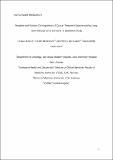Files in this item
Negative and positive consequences of cancer treatment experienced by long-term osteosarcoma survivors : a qualitative study
Item metadata
| dc.contributor.author | Fauske, Lena | |
| dc.contributor.author | Bondevik, Hilde | |
| dc.contributor.author | Bruland, Øyvind S. | |
| dc.contributor.author | Ozakinci, Gozde | |
| dc.date.accessioned | 2016-03-01T00:12:40Z | |
| dc.date.available | 2016-03-01T00:12:40Z | |
| dc.date.issued | 2015-11 | |
| dc.identifier | 212720352 | |
| dc.identifier | 6ede217d-d4e9-483c-997e-dad3bc9b5833 | |
| dc.identifier | 84946017819 | |
| dc.identifier | 000363794900041 | |
| dc.identifier.citation | Fauske , L , Bondevik , H , Bruland , Ø S & Ozakinci , G 2015 , ' Negative and positive consequences of cancer treatment experienced by long-term osteosarcoma survivors : a qualitative study ' , Anticancer Research , vol. 35 , no. 11 , pp. 6081-6090 . | en |
| dc.identifier.issn | 0250-7005 | |
| dc.identifier.other | ORCID: /0000-0001-5869-3274/work/27163469 | |
| dc.identifier.uri | https://hdl.handle.net/10023/8340 | |
| dc.description | This work was supported by the Helse Sor Ost, grant no. 2013032. | en |
| dc.description.abstract | Background: Our study aimed to explore how survivors of osteosarcoma of the lower extremity experience physical and psychosocial late effects several years after undergoing arduous treatment. A qualitative, phenomenological and hermeneutic approach was applied. Materials and Methods: Osteosarcoma survivors (n=8) who were previously treated at the Norwegian Radium Hospital, Oslo University Hospital, participated in the study. In-depth and semi-structured interviews were conducted. The interviews were analysed using inductive thematic analysis. Results: Three to ten years after diagnosis, the majority of participants had experienced both negative and positive consequences following treatment. Changes in activity and exclusion from participation in different areas were the most challenging consequences. Several of their experiences are similar to those described by people with disabilities. Conclusion: It is important to understand osteosarcoma survivors’ own experiences in order to assist those who struggle to reorient in life and to construct a new identity for themselves. | |
| dc.format.extent | 322353 | |
| dc.language.iso | eng | |
| dc.relation.ispartof | Anticancer Research | en |
| dc.subject | Bone cancer | en |
| dc.subject | Osteosarcoma | en |
| dc.subject | Qualitative | en |
| dc.subject | Cancer survivors | en |
| dc.subject | Disability | en |
| dc.subject | Posttraumatic growth | en |
| dc.subject | RC0254 Neoplasms. Tumors. Oncology (including Cancer) | en |
| dc.subject | NDAS | en |
| dc.subject | SDG 3 - Good Health and Well-being | en |
| dc.subject.lcc | RC0254 | en |
| dc.title | Negative and positive consequences of cancer treatment experienced by long-term osteosarcoma survivors : a qualitative study | en |
| dc.type | Journal article | en |
| dc.contributor.institution | University of St Andrews. St Andrews Sustainability Institute | en |
| dc.contributor.institution | University of St Andrews. School of Medicine | en |
| dc.contributor.institution | University of St Andrews. Health Psychology | en |
| dc.description.status | Peer reviewed | en |
| dc.date.embargoedUntil | 2016-03-01 | |
| dc.identifier.url | http://ar.iiarjournals.org/content/35/11/6081.full | en |
This item appears in the following Collection(s)
Items in the St Andrews Research Repository are protected by copyright, with all rights reserved, unless otherwise indicated.

